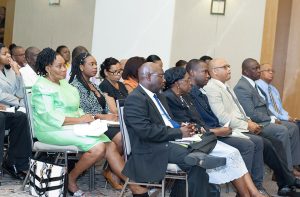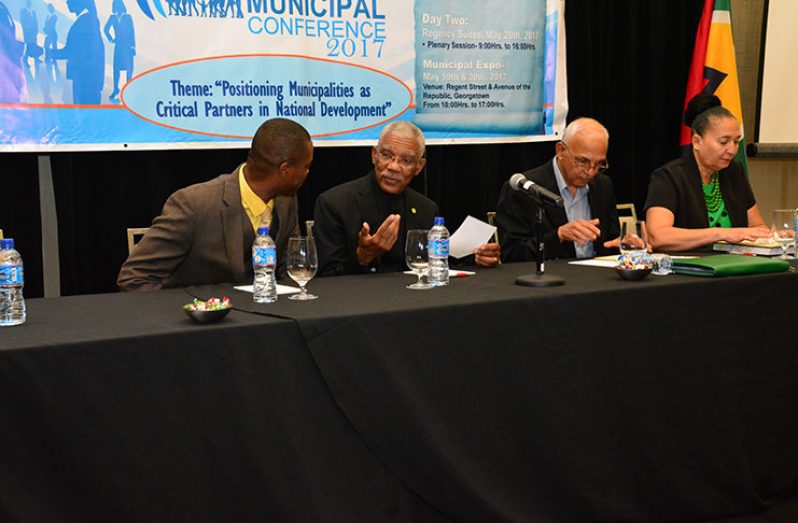…President tells municipal confab
COMMUNITIES Minister Ronald Bulkan on Friday lauded the hosting of the inaugural municipal conference by the Guyana Association of Municipalities (GAM), but did not hesitate to voice his disappointment with the absence of certain mayors and other municipal officers.
These individuals were absent, not by choice, but as a result of orders handed down to them by their selfish political ‘masters’, said Bulkan, whom he contended are engaged in an imaginary struggle. “Those mayors very much wanted to be part of this historic activity; they were an integral part, over many months, in the planning of this conference. Their absence sadly is an enforced one; an imposition that is the product of warped thinking. They are not being asked to serve and represent the interests of their residents, but rather, masters located elsewhere; selfish individuals, engaged in imaginary struggle,” said the minister.
The two-day conference organised by GAM under the theme, “Positioning municipalities as critical partners in national development,” opened at the Marriott Hotel and will continue today at the Regency Suites Hotel. The conference showcases the wealth of each of Guyana’s nine municipalities, creates opportunities for networking, and provides a forum for discussion of key local government issues affecting people. Pivotal to the agenda is also the advancement towards capital towns. Sadly, the mayors and other officers of the Rose Hall, Corriverton, and Anna Regina municipalities could not benefit from this “historic” event that seeks to rebuild the local government system, the minister posited.
REMAIN FOCUSED
Although they were ordered not to participate, Minister Bulkan urged them to remain focused and not to give up their struggle. He encouraged them to think of their residents and communities; to be leaders and not followers. “Your steadfastness will be to the benefit of residents,” he said. Following his presentation, Bulkan told the Chronicle that the behaviour of the officers is beginning to develop into a pattern as earlier this year, they had similarly boycotted an activity that was focused on regional leadership.
“This is a continuation of the very attitude. The municipalities of Rose Hall, Corriverton and Anna Regina have evidently received similar instructions not to participate in this conference,” he expressed, adding: “That attitude represents being wedded to the concept of central control, and that is outdated and irrelevant; it does not belong in a modern construct. It is not in consonance with the philosophy of this administration, which is to empower our local democratic organs in keeping with constitutional provisions to be able to execute their responsibilities. It’s a sad affair.”
No place for partisan or political interests
Meanwhile, in his address to the conference, President David Granger said that the nine municipalities which are established by the Constitution of Guyana, must demonstrate to the people whom they have sworn to serve, the values of representativeness, inclusiveness and effectiveness,as he noted that there is no place for partisan or political interests and the will of the people must take priority.
The President was at the time delivering the feature address at the opening ceremony of the conference. The Head of State said that the municipalities are responsible to their constituents who have elected them to office and as such, the will of the people is paramount. He noted that they must exercise the authority, which was given to them by the people, in a democratic manner. “Once you are elected, almost in a moment, in the twinkling of an eye, your responsibilities go to your constituents. Your responsibilities go to the people of the whole town, of the whole city and at the regional level, your responsibilities are to the people of that region,” President Granger said.
The President told the municipal office holders that they cannot succeed in politics if partisan or personal interests are placed ahead of the “popular will,” as he reminded that they have been elected to serve the people and as such, their performance will determine whether they are re-elected.
Speaking to his vision of having capital towns established in the Essequibo Islands-West Demerara (Region Three), Demerara-Mahaica (Region Four) and Mahaica- Berbice (Region Five), the President told the regional officials that a concerted effort is required to make the towns thriving commercial hubs. In this regard, he noted that regional agricultural and commercial exhibitions can play an important role in developing these three regions, along with Bartica, Lethem and Mabaruma. President Granger said that people are looking to their municipalities for leadership and vision and this must be provided. The Head of State expressed the hope of seeing the capital towns becoming hubs for eco-tourism, even as Guyana continues to pursue a ‘green’ economy, with each town adding value to the products that they have, making them attractive for tourists.

“Once the regional chairmen, once the mayors realise what a gem they have on their hands, they realise they have been sitting on their hands. People want to come and see our flora and fauna and they often say the Kanuku Mountains have more species of birds than the whole of Western Europe…that’s what mayors do, look for business opportunities,” President Granger said.
Speaking on the transition of Guyana to a ‘green’ state, President Granger said ‘greenness’ is not a fad, but it is about proper disposal of solid waste, pointing to the fact that improper waste disposal leads to the emergence of diseases. “When we speak of the ‘green’ state, we speak about healthy communities. When we speak of a ‘green’ state, we speak about the sustainable generation of energy, so that schools, hospitals, police stations, clinics could all be powered by renewable energy sources. Every region has abundant sunshine, abundant wind; some regions have biomass possibilities, because of the sugar industry or rice industry. Some regions have hydro-power potential,” the President pointed out.
However, for the vision of national development to be realised, the Head of State said that it is imperative that every citizen work together.
KEY CHANGES EFFECTED
Minister Bulkan also recalled how for many decades, local government was considered to have little or no relevance and was so treated by the central Government.
In fact, he said a centralised approach to governance was the order of the day for decades and that few will forget the period of micromanagement that was a feature of the first 15 years of this century.
“Communities and people were victims of this approach and practice. Change, however, started to come following the general and regional elections of November 2011 and the advent of President David Granger as Leader of the Opposition in an opposition-majority Parliament. The records will show that under his leadership, local government was placed on the front burner. It was the combined APNU+AFC that effected key changes in local government bills brought before the 10th Parliament that would return authority to our local democratic organs.”
Bulkan said the previous administration did not want such organs to have independence as was proven by the fact that former president Donald Ramotar refused to sign the local government bill. “So, local government reform had to await the arrival of a new President.” The minister charged that neglect of the local government system was so severe,and that the capacity of councils were so damaged and degraded that they had become largely dysfunctional.



.jpg)








